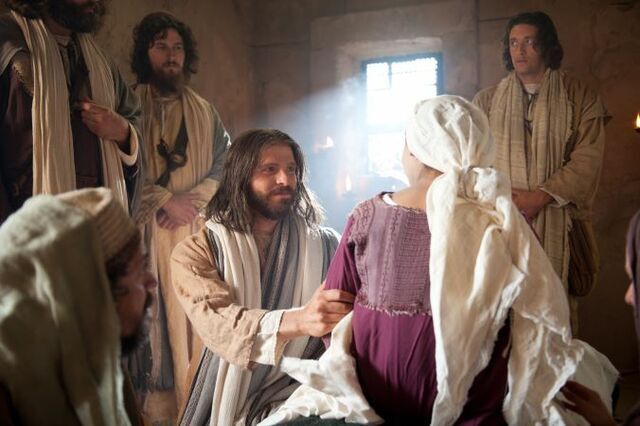After agreeing to speak in sacrament meeting, I flipped through my study journals from the past year looking for inspiration. As I did, I was surprised to see that most of my spiritual impressions were pointing me toward one central message:
“Look unto me in every thought. Doubt not, fear not,” (Doctrine and Covenants 6:36).
While that scripture's length may suggest simplicity, I am finding its doctrine is not easy in practice. In fact, President Russell M. Nelson said, “It is mentally rigorous to strive to look unto Him in every thought. But when we do, our doubts and fears flee.”
Looking to Christ to help me manage my every thought and emotion is taking a lot of practice—it is rigorous! But it is also liberating. I am freeing myself from self-doubt and the trap of believing that things will never get better.
As I prepared my talk, I realized I may have been looking at Doctrine and Covenants 6:36 all wrong. I used to think it was a verse with three commandments: 1) Look unto me, 2) doubt not, and 3) fear not. But now I see it as one commandment followed by two blessings. Perhaps the Lord is saying, look unto me in every thought, and I will help you doubt not and fear not.
I've noticed at least three specific ways looking to God can make a significant difference in our lives. And the fruits of that difference are blessings I think we all crave.
1. Look to God for the Faith in the Future
In May, I finished college. In the months leading up to graduation I had a lot of conversations that went something like this:
Some kind person: “Wow! This is so exciting! I can’t wait to see what comes next for you!”
Me on the outside: “Thank you! I am excited and grateful this is happening.”
Me on the inside: “Oh my gosh, this is terrifying. What am I going to do with my life?”
College was hard but so good, and I feared there was nothing out there for me next but the coronavirus. I did a lot of praying to not feel so scared. To be reassured. To stop fearing and doubting. And this brief excerpt from a book by Emily P. Freeman, who belongs to a different Christian denomination, was my answer:
So often, right after Jesus performed a miracle, he gave a simple next thing to do. To the leper, he said to tell no one, “But go and show yourself to the priest. To the paralytic, he said, “Get up, pick up your stretcher, and go home.” To Jairus and his wife, after raising their daughter from the dead, when he had their full and complete attention, and when chances were good he could get them to swear their lives away for his sake, he did not perform a lecture about dedicating their lives to him or about what grand plans he had for their girl now that she was alive. Instead, he told them to give her something to eat. After raising their daughter from the actual dead, the one thing Jesus told them in the face of their rapt attention was to go make lunch. At first glance that seems like a waste of a captive audience.

Rather than a life plan, a clear vision, or a five-year list of goals, the leper, the paralytic, and Jarius and his wife were given clear instructions by Jesus about what to do next--and only next. Perhaps he knows something about our addiction to clarity. He knew if we could somehow wrangle a five-year plan out of him, we would take it and be on our merry way.
After Jesus performed miracles, he made the next right thing unmistakably clear. But what about for us? Let’s take our cues from Jesus by considering what it means for us to do the next right thing now. Not the next big thing. Not the next impressive thing. Just the next right thing in front of us (emphasis added).
Don't you love that? "The next right thing" has become somewhat of a mantra in my life now.
About two months ago I started a new job helping to manage LDS Living’s bi-monthly magazine. So far, the most stressful part of the job for me is being patient as we plan future content and wait for articles to fall into place. I would love to just have all the content for the next five years lined up, and then I could comfortably spend all the time I want making things perfect—never having to worry about a missing article.
But it doesn’t work like that. It can’t work like that. Most of the stories we will feature in the magazine haven’t even happened yet!
Do we ever do the same thing with our lives? Do we stress over trying to plan things that we just can’t plan yet? We can only go so far before we, like the Jaredites in their barges, we have to let it go and “commend ourselves to God” (see Ether 6:4).
Looking to God for the future has encouraged me to live as if my life is important, like I have something I need to accomplish so I’d better keep moving—in fact, I’d better hustle, but I need to do it a day at a time with Christ.
2. Look to God to Stop Condemning Yourself for Weakness
By looking to God, we can learn to stop condemning ourselves for our weakness and find the confidence to try.
I was studying Joseph Smith—History earlier this month and was struck by a line I’d never noticed before. But first, let me remind you of the context. When Joseph was 14-years-old he wanted to know what to do in order to be right with God. After wrestling with the question for a while, Joseph decided to pray and ask God directly what to do. In response to that prayer, Joseph had a miraculous experience: God and Jesus Christ themselves appeared to him. They explained that, at the moment, the full plan of how to live with God again wasn’t anywhere on the earth, but that Joseph would help bring it back.

I imagine Joseph walked out of that grove blown away by what had just happened to him.
But then three years go by and nothing happens. Three years is an eternity for a teenager! I’d never considered what Joseph would have been feeling and thinking during that time. Maybe excited at first? And then nervous? And then just confused?
Joseph tells us in his history at least a little of what he was thinking after those three years: “I often felt condemned for my weakness and imperfections.”
Oh, poor Joseph.
Maybe he was wondering if he could really do what Christ had told him about. Maybe he thought God had changed his mind and found someone else to do the job. Was Joseph just not good enough after all?
Gratefully, Joseph didn’t wallow helplessly in his fears. Instead, he looked unto God.
Joseph prayed to know his “standing before God.” In answer to that prayer, Joseph had a vision in which an angel assured him that God still wanted him. God still had a work for Joseph to do. I’ve wondered if Joseph let out a little sigh of relief once the angel left.
I was struck by Joseph’s example of looking to God in the face of self-doubt, but also by what looking to God did for Joseph’s confidence the rest of his life.
I can only assume that Joseph felt inadequate later in his life, but I don’t know of a time when he was held back by those feelings. Joseph seems to stop worrying quite so much about his weaknesses when he learns that God is merciful and helpful, not harsh and condemning.
Looking to God in every thought taught Joseph what God is like, and it can do the same for us.
When we learn that God is good, we can trust Him to use us despite our weaknesses, and we stop worrying about them so much ourselves. I believe we will feel more confident in trying new things or taking on difficult projects because we know that God in all His goodness will be there to help us.
Looking to God will help us stop worrying about results and just try.
Look to God to Overcome Fear
Do you ever just sit and think about how good it will be in heaven? It makes for a wonderful meditation prompt, if you’re into that. In that spirit, I’ve pondered over this quote from President Nelsononly a hundred times:

In a coming day, you will present yourself before the Savior. You will be overwhelmed to the point of tears to be in His holy presence. You will struggle to find words to thank Him for paying for your sins, for forgiving you of any unkindness toward others, for healing you from the injuries and injustices of this life.
You will thank Him for strengthening you to do the impossible, for turning your weaknesses into strengths, and for making it possible for you to live with Him and your family forever. His identity, His Atonement, and His attributes will become personal and real to you.
But you don’t have to wait until then. Choose to be one of His true disciples now. Be one who truly loves Him, who truly wants to serve and lead as He did.
I’ve learned that taking time to think about Christ and our future with Him brings a very real power to overcoming fearful thoughts. But that time with Christ has to be intentional—and daily.
A few months ago, I read a few pages of a book by a favorite artist of mine every day before bed. And you know what? I caught myself starting to think about and like her, and even talk like she writes. This was not necessarily a bad thing; it just showed me how powerful consistent repetition is. If you want Christ to be on your mind, you’ve got to think about Him. (Simple logic, but perhaps helpful to hear someone say it.)
For our fears to flee, we need to chase them out with concentrated daily reminders. That seems to be what Mormon his telling is son in Moroni 9:25 (emphasis added):

"My son, be faithful in Christ; and may not the things which I have written grieve thee, to weigh thee down unto death; but may Christ lift thee up, and may his sufferings and death, and the showing his body unto our fathers, and his mercy and long-suffering, and the hope of his glory and of eternal life, rest in your mind forever."
Coming from Mormon that means a lot! Mormon’s life was full of despair. He couldn’t escape it. Most of his family was dead, everyone around him was evil, and he had to wander around the continent just to survive. In other words, he must have become a real pro at looking to God to chase out fear—he had no other distractions to do it for him.
Mormon’s instruction to his son is to not let his fears “weigh him down to death” but instead to think about all that Christ has done and let that “lift him up.” We too can experience this lifting up, but it requires more than a quick prayer or one verse of scripture before bed. For me, it usually takes immersing myself in the truths of the plan of salvation by quieting distractions and really focusing. Truth doesn’t just slip in uninvited for me. But when I consistently leave the door open, then it comes. Sometimes slowly, sometimes in a rush.
When fears weigh you down, let Christ lift you up. The Liahona published an article that made me love Mormon's and Moroni's examples even more. Here’s my favorite portion of the article:
When things seem like they can’t possibly get any worse, we can take comfort in keeping an eternal perspective and cultivating Moroni-like faith. If we do so, we are promised we “can do all things which are expedient unto [Christ]” (Moroni 10:23). We can know that Heavenly Father is with us. We can trust that His plan of happiness will provide a way for us to overcome every single tragedy we will face in mortality. And we can surround ourselves with the light, joy, and blessings of the restored gospel of Jesus Christ.
With an eternal perspective, we always have a reason to hope. And we can trust that one day we will all be able to say, “How could things possibly get any better?
I truly do believe that “all things work together to them that love God”—or in other words, for those that look to God (Romans 8:28). I believe that looking unto God in every thought, doubting not, fearing not is a lifestyle. And one that I’m grateful for.



